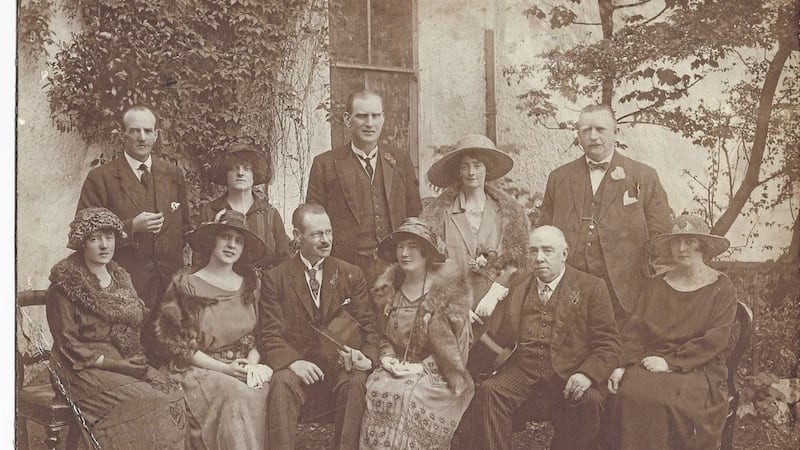In the 1880s, Donegal was one of the most economically depressed counties in Ireland. At that time, the only newspaper in the county was The Donegal Independent, an organ of the ascendancy class.
As the Land League campaign continued, the need for it to have a local media outlet was evident and one John Mac Adam, at that time a reporter with the Tuam Herald, was invited to Donegal where he founded The Donegal Vindicator. The first issue was dated February 4, 1889 and published in Ballyshannon. The newspaper quickly established itself as an organ of the tenant rights movement.
Mac Adam was the Glasgow-born son of Donegal parents and had served his newspaper apprenticeship in the Glasgow Herald. He quickly went on to also establish the Derry Weekly News. And so, my grandmother spent her childhood years shuttling back and forth on the train between Derry and Ballyshannon, depending on what day of the week it was and which paper was going to press, for John, or Pa Mac Adam as he was known to the family, was my great grandfather.
My grandmother Nora used to tell me stories about how she and her sisters would get the first train out of Ballyshannon on a Monday morning and there would be a mad dash from Foyle Road to the Convent of Mercy school on Pump Street to be in time for assembly. She also recalled one Monday during the school holidays, they were joined in their carriage by two Orangemen in full regalia who had boarded the train in Rossnowlagh, where it seems they had spent the night making merry following the annual Twelfth parade in the village. Evidently, they did not belong to a temperance lodge.
The three sisters, like steps on stairs, went off to UCD where they had the distinction of being taught by Thomas Mac Donagh, a signatory of the 1916 Proclamation. Throughout the period of the Easter Rising and its aftermath, the War of Independence and Civil War, they travelled back and forth between Dublin, Derry and Ballyshannon and as their father’s daughters, had developed a keen sense of what was newsworthy and helped filled the pages of his papers.
Thanks to the reminiscences and research of my cousins John Ward and Cristín Leach, we have an insight into our family views and worries at the time of partition. Certainly, my grandmother did not think at the time of the passing of the Government of Ireland Act in May 1921 that it was the end of the matter and the campaign to include Derry in the new Irish Free State did not abate. Her views were shared by her sister, Eily, who surreptitiously produced a republican newspaper, An Dáil, during Pa's weekly trips to Derry - an activity that was not without consequences.
On December 2, 1921, Pa wrote in the Vindicator that he was handing "complete control, the editorship and management of the Donegal Vindicator to my daughter Miss E. Dalton MacAdam BA who proved her journalistic capacity in her first venture An Dáil which came to an abrupt end when the far-flung power of the British Empire clanged the gates of Armagh Jail behind her."
Aunt Eily wrote her first editorial on December 9, three days after the signing of the Treaty and, in subsequent issues, her despair and that of the wider family at the outworking of partition became evident. There was a palpable anger particularly at the abandonment of Derry by fellow Irish citizens.
After the ratification of the treaty by Dáil Éireann she wrote: “While Ireland is still sizzling on the political frying pan it would be well for the businessmen of the North to lay aside their ledgers and give some time to deep thought....for a time at least Ireland will be a divided country and as such its temper will be none of the best....the Free State is not prepared to fight Derry's battle for inclusion with Southern Ireland. Let the significance of that last sentence be grasped."
There was little room for a republican newspaper in the new Northern Ireland. Revenues dried up from commercial printing and from government and unionist-owned business advertisers. The Derry Weekly News ceased publication in the early 1930s whilst in Ballyshannon, the Vindicator continued in print until the early 1950s.
The Mac Adam sisters, undaunted, all continued writing throughout their lives – for newspapers, radio and the stage. I asked my grandmother once why she was always writing or typing things. Quoting Napoleon Bonaparte, she replied: “Because, a leanbh, ‘hostile newspapers are more to be feared than a thousand bayonets.’”
--
:: Patricia Mac Bride is a lawyer specialising in working with refugees and asylum seekers and in child and family law. She is a regular political analyst and commentator for television and radio throughout the island of Ireland and internationally. From 2008 to 2012, she served as Commissioner for Victims and Survivors. Patricia is a co-founder of Women in Media Belfast. She will be joining The Irish News as a regular columnist later this month.


